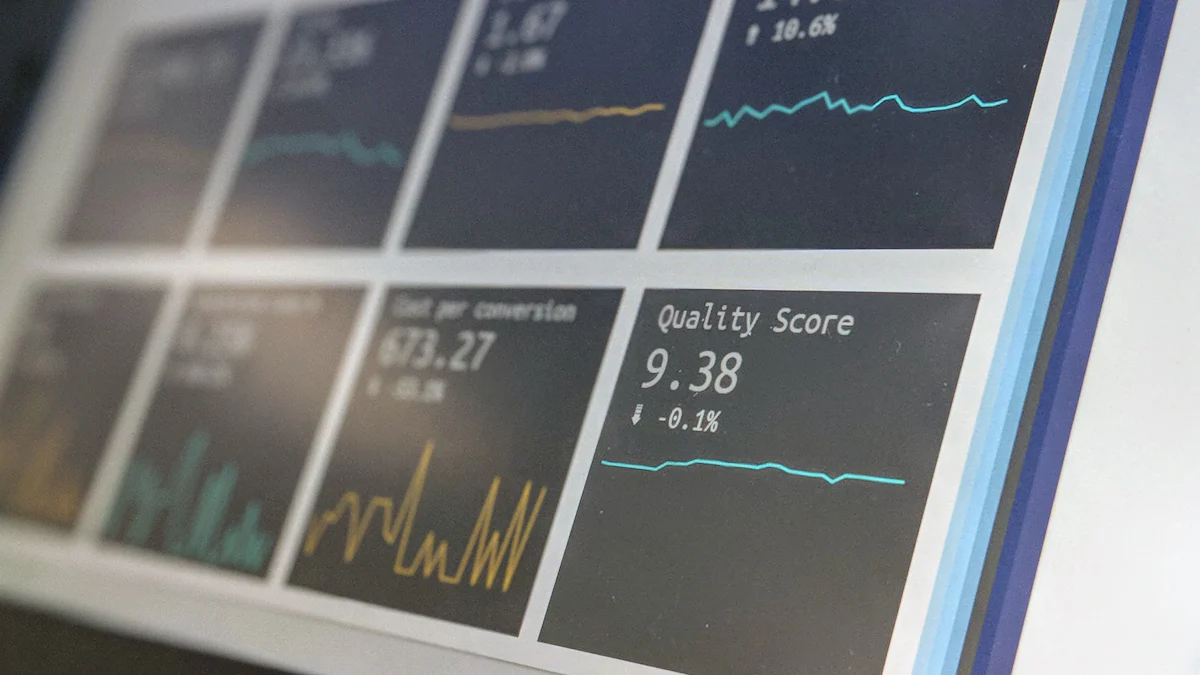

MQL to SQL Conversion Rate
Sean, Industry Editor
Sep 10, 2024

Marketing Qualified Leads (MQLs) and Sales Qualified Leads (SQLs) represent crucial stages in the sales funnel. MQLs show interest through actions like downloading resources or signing up for newsletters. SQLs demonstrate readiness to engage with sales teams. The MQL to SQL conversion rate measures how effectively marketing efforts transition leads into potential sales opportunities. Understanding this metric is vital for optimizing marketing strategies. Companies with high conversion rates often exceed 40%, showcasing efficient processes. A typical conversion rate stands at 13%, serving as a benchmark for evaluating lead conversion success.
Understanding MQL to SQL Conversion Rate

Definition and Explanation of MQL to SQL Conversion Rate
What is MQL?
Marketing Qualified Leads (MQLs) show genuine interest in your products or services. Actions like downloading resources or subscribing to newsletters indicate this interest. MQLs represent potential customers who engage with marketing efforts.
What is SQL?
Sales Qualified Leads (SQLs) are ready for direct sales engagement. SQLs demonstrate a higher level of interest and readiness to make a purchase. The transition from MQL to SQL marks a critical step in the sales funnel.
Importance of MQL to SQL Conversion Rate
Role in Marketing and Sales Alignment
The MQL to SQL conversion rate plays a vital role in aligning marketing and sales teams. High conversion rates indicate effective communication between these departments. This alignment ensures that marketing efforts target the right audience, leading to increased sales opportunities.
Impact on Business Growth
A strong MQL to SQL conversion rate drives business growth. Companies with efficient conversion processes often exceed industry benchmarks. For example, a typical conversion rate stands at 13%. Businesses achieving higher rates see significant improvements in revenue and market presence.
Harsh P, an expert in lead generation, emphasizes the importance of connecting leads directly to sales success. Explore strategies to enhance your conversion rate and drive growth.
Industry Benchmarks for MQL to SQL Conversion Rates
Average Conversion Rates Across Industries
Technology Sector
The technology sector often showcases a robust MQL to SQL conversion rate. Companies in this industry typically achieve conversion rates ranging from 13% to 26%. This range reflects the effectiveness of marketing strategies tailored to tech-savvy audiences. Businesses in this sector should aim for the higher end of this spectrum. Achieving this can lead to increased sales opportunities and revenue growth.
Healthcare Sector
In the healthcare sector, the MQL to SQL conversion rate varies significantly. Conversion rates can range from 10% to 30%. This variation arises from diverse marketing approaches and lead sources. Healthcare companies must focus on refining their lead qualification processes. Doing so can help them reach the upper limits of this range. High conversion rates in healthcare can enhance patient engagement and service delivery.
Factors Influencing MQL to SQL Conversion Rates
Lead Quality
Lead quality plays a crucial role in determining the MQL to SQL conversion rate. High-quality leads exhibit genuine interest and readiness for sales engagement. Businesses must prioritize lead generation efforts that attract qualified prospects. Effective targeting and segmentation can improve lead quality. Enhanced lead quality directly boosts conversion rates.
Marketing Strategies
Marketing strategies significantly impact the MQL to SQL conversion rate. Tailored campaigns resonate better with target audiences. Personalization and relevant content increase lead engagement. Businesses should continuously evaluate and optimize their marketing tactics. Successful strategies align with audience needs and preferences. Improved marketing efforts lead to higher conversion rates and business success.
Implications of Low MQL to SQL Conversion Rates
Challenges Faced by Businesses
Ineffective Lead Nurturing
Low MQL to SQL conversion rates often highlight ineffective lead nurturing. Businesses struggle when marketing efforts fail to engage leads effectively. Companies must understand that nurturing involves consistent communication and value delivery. Without proper nurturing, leads lose interest and drop out of the sales funnel. A lack of engagement results in poor conversion rates. Businesses need to implement strategies that keep leads engaged and interested.
Misalignment Between Marketing and Sales
Misalignment between marketing and sales teams poses a significant challenge. This misalignment leads to confusion about lead quality and readiness. Marketing teams may pass leads that sales teams consider unqualified. Such discrepancies hinder the MQL to SQL conversion rate. Effective collaboration between these teams is crucial. Businesses must ensure both teams share common goals and criteria for lead qualification. Alignment improves communication and boosts conversion rates.
Need for Improved Strategies
Enhancing Lead Qualification
Businesses must enhance lead qualification processes to improve conversion rates. Proper lead qualification ensures that only high-quality leads move to the sales stage. Companies should use data-driven insights to assess lead potential. Automation tools can streamline the qualification process. Studies show that automating lead management increases conversions by over 10%. Enhanced qualification processes result in better MQL to SQL conversion rates.
Implementing Better Nurturing Tactics
Improved nurturing tactics play a vital role in boosting conversion rates. Personalized content and targeted communication engage leads more effectively. Businesses should tailor their messaging to address specific lead needs. Marketing strategies must focus on delivering value at every touchpoint. Companies should continuously evaluate and refine nurturing tactics. Effective nurturing increases the likelihood of leads transitioning from MQL to SQL.
Importance of Tracking MQL to SQL Conversion Rates
Benefits of Monitoring the Metric
Identifying Areas for Improvement
Monitoring the MQL to SQL conversion rate reveals areas needing improvement. Businesses can pinpoint weak spots in lead nurturing processes. Identifying these gaps helps refine strategies for better results. Companies must focus on enhancing lead quality and engagement. This attention leads to higher conversion rates and increased sales success.
Enhancing Marketing Efforts
Tracking the MQL to SQL conversion rate enhances marketing efforts. Businesses gain insights into campaign effectiveness. Understanding what works allows for strategic adjustments. Marketers can tailor content to resonate with target audiences. Improved marketing strategies drive more qualified leads through the funnel. This focus boosts overall conversion rates and business growth.
Tools and Techniques for Tracking
CRM Systems
CRM Software plays a crucial role in tracking the MQL to SQL conversion rate. These systems manage interactions with potential customers. Businesses use CRM tools to monitor lead progress through the sales funnel. Effective CRM automations identify strong sales opportunities. Knowing when to transition an MQL to an SQL minimizes wasted resources. Companies benefit from streamlined processes and improved conversion rates.
Analytics Software
Analytics software provides valuable insights into the MQL to SQL conversion rate. Businesses use data analytics to monitor engagement and conversion metrics. These tools help adjust campaigns based on performance. Marketing automation tools enhance personalization and streamline lead nurturing. Companies that leverage analytics see significant improvements in conversion rates. Data-driven decisions lead to more efficient marketing strategies and increased revenue.
Strategies for Improving MQL to SQL Conversion Rates

Actionable Insights of MQL to SQL Conversion Rate
Aligning Marketing and Sales Teams
Aligning marketing and sales teams is crucial for improving the MQL to SQL conversion rate. Companies must ensure that both teams share common goals and understand the lead qualification process. Effective communication between these teams leads to better targeting of potential customers. Businesses should hold regular meetings to discuss strategies and share insights. This collaboration enhances the efficiency of converting MQLs into SQLs.
Optimizing Lead Scoring Models
Optimizing lead scoring models significantly impacts the MQL to SQL conversion rate. Companies need to evaluate their current scoring criteria and adjust them based on performance data. Businesses should prioritize factors that indicate a lead's readiness to purchase. Automation tools can streamline this process, ensuring that only high-quality leads advance to the sales stage. Studies show that automating lead management increases conversions by over 10%. Improved lead scoring models result in higher conversion rates and increased revenue.
Case Studies and Examples of MQL to SQL Conversion Rate
Successful Companies
Several successful companies have demonstrated impressive MQL to SQL conversion rates. For example, a technology firm implemented automation tools to enhance lead management. The company saw a 15% increase in conversion rates within six months. Another healthcare provider focused on aligning marketing and sales teams. The organization achieved a conversion rate of 25%, exceeding industry benchmarks. These examples highlight the importance of strategic adjustments in the conversion process.
Lessons Learned
Lessons learned from successful companies emphasize the value of continuous improvement. Businesses must regularly assess their MQL to SQL conversion rate and identify areas for enhancement. Effective strategies involve aligning teams, optimizing lead scoring, and leveraging automation. Companies should remain adaptable and open to new approaches. Embracing these lessons leads to sustained growth and improved sales performance.
Understanding the MQL to SQL conversion rate is essential for business success. High conversion rates show effective marketing and sales efforts, leading to increased revenue. Businesses should focus on refining strategies to improve these rates. Evaluating current processes helps identify areas needing improvement. Aligning marketing and sales teams ensures a seamless transition from leads to customers. Implementing these changes boosts sales performance and drives growth. Start optimizing your conversion strategies today to enhance your business outcomes.
FAQ
The MQL to SQL conversion rate measures the percentage of marketing qualified leads (MQLs) that transition into sales qualified leads (SQLs). This metric evaluates how effectively marketing efforts qualify and screen leads. A higher conversion rate indicates successful lead management.
The MQL to SQL conversion rate plays a crucial role in assessing the efficiency of your marketing and sales teams. A strong conversion rate signifies that marketing teams generate high-quality leads. Sales teams then effectively engage these leads. This alignment boosts revenue and enhances business growth.
Improving the MQL to SQL conversion rate requires strategic adjustments. Businesses should focus on enhancing lead qualification processes. Automation tools streamline lead scoring and management. Aligning marketing and sales teams ensures effective communication. Regularly evaluate and optimize marketing strategies for better results.
Low MQL to SQL conversion rates often indicate ineffective lead nurturing or misalignment between marketing and sales teams. Businesses may struggle with poor lead quality or lack of engagement. Addressing these challenges involves refining lead qualification and nurturing tactics. Collaboration between teams enhances conversion success.
CRM systems and analytics software play vital roles in tracking the MQL to SQL conversion rate. CRM tools manage interactions and monitor lead progress. Analytics software provides insights into engagement and conversion metrics. These tools help businesses make data-driven decisions and improve conversion rates.
Industry benchmarks provide valuable context for evaluating your MQL to SQL conversion rate. A typical conversion rate stands at 13%. Businesses should aim to exceed this benchmark for optimal performance. Understanding industry standards helps set realistic goals and measure success.
Continue Reading About MQL to SQL Conversion Rate
10 Game-Changing Project Management Reporting Types!
Unlock project success with 10 must-know reporting types! Track progress, manage risks, and stay on budget like a pro.
Lewis
Mar 03, 2025
15 Best Software Reporting Tools for 2025
Explore the top 15 software reporting tools for 2025. Compare features, pricing, and usability to find the best fit for your business needs.
Lewis
Oct 08, 2024
2025 Data Pipeline Examples: Learn & Master with Ease!
Unlock 2025’s Data Pipeline Examples! Discover how they automate data flow, boost quality, and deliver real-time insights for smarter business decisions.
Howard
Feb 24, 2025
2025 Best Data Integration Solutions and Selection Guide
Explore top data integration solutions for 2025, enhancing data management and operational efficiency with leading platforms like Fivetran and Talend.
Howard
Dec 19, 2024
2025's Best Data Validation Tools: Top 7 Picks
Explore the top 7 data validation tools of 2025, featuring key features, benefits, user experiences, and pricing to ensure accurate and reliable data.
Howard
Aug 09, 2024
Augmented Analytics: Unlock the Core Concepts & Benefits!
Discover augmented analytics—where AI and ML automate data prep and insights, revolutionizing decision-making for smarter, faster business strategies!
Lewis
Mar 04, 2025


